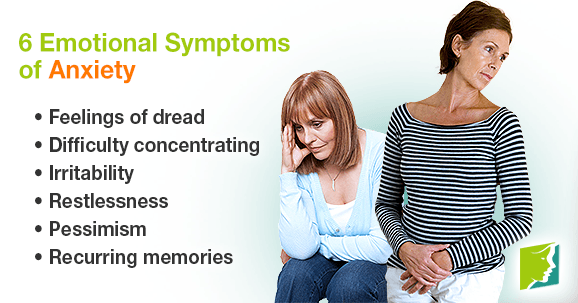Unlike the occasional nervous feelings that subside after a while, anxiety is described as a psychological state. There are several anxiety disorder types, which include generalized anxiety disorder, panic disorder, social phobia, post-traumatic stress disorder, obsessive compulsive disorder, and separation anxiety. Symptoms of anxiety can be categorized into emotional and physical and vary between the types of anxiety. This article focuses on the emotional symptoms of anxiety, as well as some helpful treatment tips.
Causes
Hormone fluctuations are one of the leading causes of anxiety in women, due to estrogen's major role in the regulation of emotion and mood. Other factors that can prompt anxiety include high stress (either at work or at home), genetics, certain medications, excessive caffeine intake, previous emotional or physical trauma, lack of exercise, and poor diet.
Emotional Symptoms
Emotional symptoms are just one prong of anxiety, and they are often accompanied by physical and behavioral symptoms. Below are the most common emotional effects of anxiety.
Feelings of dread
This symptom typically accompanies all types of anxiety disorders, but is especially apparent in generalized anxiety disorder and social anxiety disorder. These feelings of dread can occur when faced with a potentially stressful situation, like public speaking or meeting new people.
Difficulty concentrating
People suffering from generalized anxiety disorder usually experience difficulty concentrating or their minds going blank because they are overwhelmed by stresses at home or work.
Irritability
Irritability is a common emotional symptom of anxiety disorders because anxiety causes constant tension and stress. People with anxiety may snap at others without meaning to.
Restlessness
Feeling restless and having difficulty sleeping are other common symptoms of anxiety. Your age, lifestyle, and diet all play a part in influencing the amount of sleep you need, but the ensuing insomnia can make getting a full night's sleep difficult.
Pessimism
Having a negative outlook is typical among people suffering from anxiety. They tend to think that disaster is always near and nothing is going right.
Recurring memories
This is common among those suffering from post-traumatic stress disorder. Recurring memories of a traumatic event (e.g., war, car accident, physical abuse) often plague them, causing distraction and constant distress.
Managing Anxiety
Exercising regularly is the key to reducing stress and releasing “feel-good” neurotransmitters, like serotonin, in the brain. Ideally, one should get around 30 minutes of aerobic activity every day five days of the week. Walking, cycling, and yoga are all good forms of low-impact workouts that also help prevent future anxiety episodes. Keeping a strong support system can also be very beneficial in dealing with anxiety. Talking with close friends and family about what you are experiencing will help them better understand your condition.
Panic disorder, social phobia, and post-traumatic stress disorder are among the many forms of anxiety. Emotional symptoms of anxiety can vary, but the most common are irritability, feelings of dread, and restlessness. Exercising and talking with friends and family are beneficial for combating anxiety and maintaining mental health. Read more about good approaches for treating anxiety.
Sources
- National Institute of Mental Health. (n.d.). Anxiety Disorders. Retrieved September 26, 2014, from http://www.nimh.nih.gov/health/publications/anxiety-disorders/index.shtml
- Office on Women's Health. (2012). Anxiety disorders fact sheet. Women's Health. Retrieved September 26, 2014, from http://www.womenshealth.gov/publications/our-publications/fact-sheet/anxiety-disorders.html




